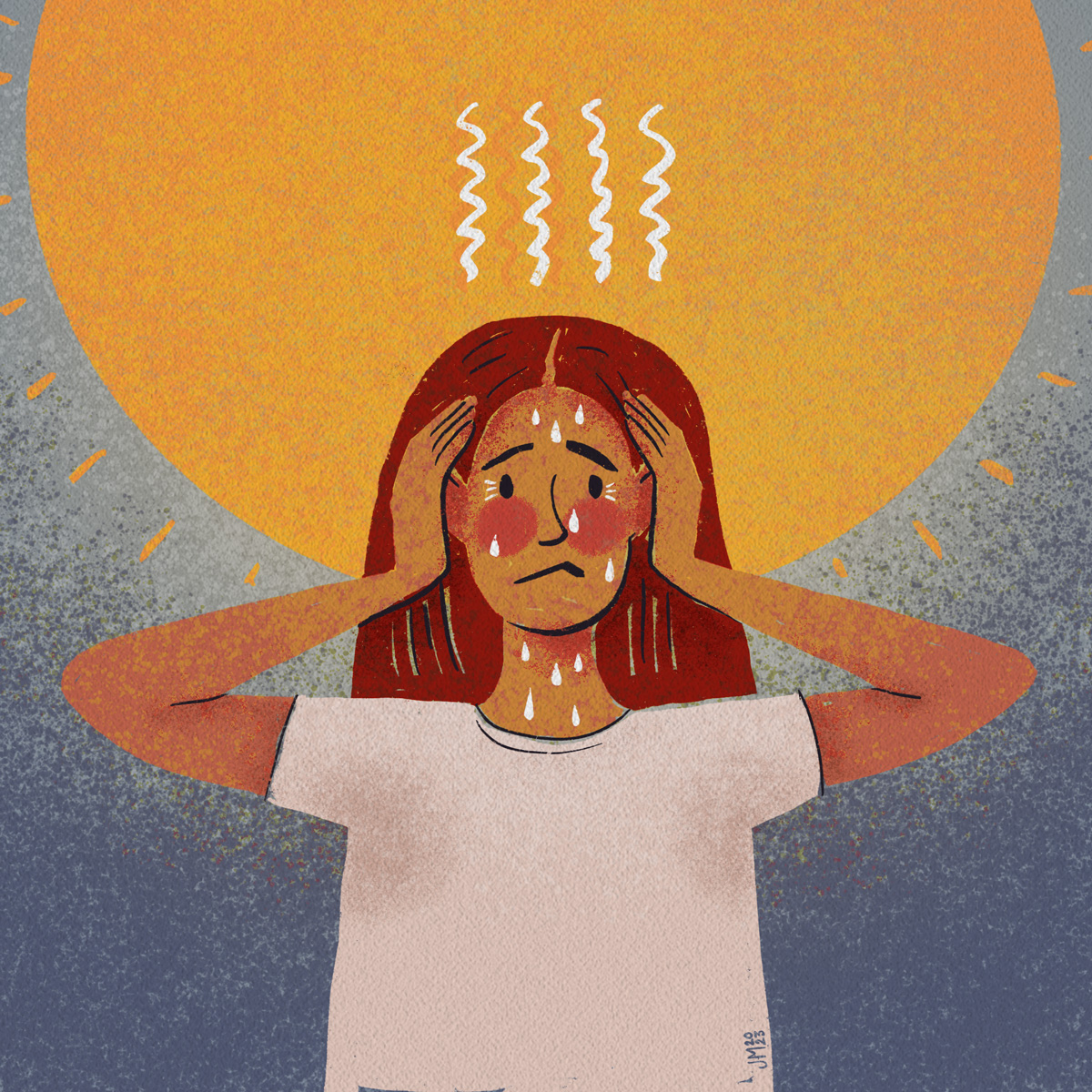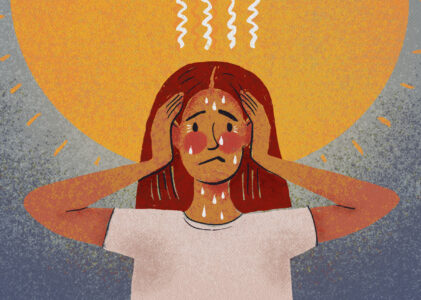When temperatures soar, mental health takes a dip. Read on for tips to cope.
Much of the US and other parts of the world are intolerably hot right now. In fact, last month was the hottest June on record for the planet, and experts predict July is on track to be the hottest month ever recorded. Blazing heat can turn a simple trip to the grocery store into a stressful and exhausting hassle. If you live with a chronic mental health condition, you may feel the effects of hot temperatures even more severely.

Illustrated by Joseph Moore
Heat waves and higher-than-normal temperatures are associated with a range of negative outcomes for mental health, from increased visits to the ER for mental health issues to changes in the ways our bodies respond to psychiatric medications. Extreme heat can make us act more aggressively, cloud our ability to problem solve and increase our risk of suicide.
With average temperatures expected to increase over the coming years and decades, it’s important to learn more about how heat affects us and take steps to protect ourselves and others.
How heat affects mental health
1. Lost sleep
This is one of the most pervasive ways that heat can affect your mental health and functioning. Sleep is closely linked to body temperature. When nighttime temperatures stay hot, it’s more difficult for your body to cool down and prepare for sleep. Elevated nighttime temperatures also affect the quality and duration of sleep, making it more likely that you’ll wake up during the night and feel less rested in the morning.
If you’re reading this, you probably already know that poor sleep can make you feel grumpy and brittle, like any small thing that goes wrong might ruin your day. Sleep helps you regulate your emotions, cope with stressors and even perceive the world accurately. Not surprisingly, poor sleep can make mental health issues like depression, anxiety and suicidal ideation worse.
2. Medication changes
Tricyclic antidepressants and most antipsychotic drugs can affect the way your body regulates temperature and put you at greater risk for heatstroke and other heat-related issues.
A known side effect of SSRI medications (common antidepressants like Prozac and Zoloft) is excessive sweating. Hot weather can worsen this effect and lead to dehydration.
The mood stabilizer Lithium is a salt that becomes more concentrated in your body when you sweat. Consequently, excessive heat and sweating can cause your lithium level to rise too rapidly and make you feel dizzy, lethargic and confused. Lithium toxicity is dangerous and requires medical attention.
3. Increased violence and aggression
From “hot tempered” to “hot under the collar,” our language is littered with phrases that connect heat with aggression, and research backs this up.
A recent study found that violent crime in Los Angeles increased by 5.7% on days with temperatures above 85 degrees Fahrenheit compared to days below that threshold.
The reasons for this connection are complex but may relate to hormone changes. There’s evidence that our bodies generate more cortisol, testosterone and adrenaline when we feel hot, which can promote aggressive behavior.
4. Decreased focus and productivity
Whether you’re working in a factory or taking an exam at school, high ambient temperatures can make it difficult to perform at your best. A study in India found that workers’ productivity declined by as much as 4% for every degree that temperatures rose above 27 °Celsius (80.6 °Fahrenheit). Another study compared students living in dorms with and without air conditioning during a span of time that included a heat wave. During the heat wave, students without air conditioning scored significantly worse on cognitive tests, including basic arithmetic.
5. Elevated mental health crises
A recent study found that people are more likely to visit the emergency department for mental health-related conditions on summer days with higher-than-normal temperatures. This relationship was especially strong for substance use, anxiety and stress disorders, and mood disorders (such as depression).
Another study analyzed data spanning multiple decades in the US and Mexico and found that higher-than-average temperatures were related to increased suicide rates. Specifically, the authors found that suicide rates rise 0.7% in US counties and 2.1% in Mexican municipalities for a 1.8 °Fahrenheit increase in monthly average temperature. As the climate continues to get hotter, suicide risk could rise as well.
How to protect your mental health when it’s hot
Prioritize sleep
Do whatever you can to cool down your bedroom. If air conditioning won’t do the trick, here are some other options to help you stay cool at night:
- Keep blinds down during the day in your bedroom.
- Fill a shallow pan with water and ice. Position a fan to blow across the pan toward your bed while you’re sleeping.
- Take a cool shower before bed.
- Buy cooling gel pads and keep them in the refrigerator. When you’re ready for bed, place the pads on your sheets to cool them down.
Give yourself a break
When heat saps your motivation and ability to perform, adjust expectations of yourself accordingly. Maybe you won’t tackle as much on your to-do list as you’d like. Maybe you’ll spend more time resting than usual. If a task isn’t essential, give yourself permission to kick the can down the road and wait for cooler weather.
Seek help
If you take medication that increases your risk of heat-related problems, talk to your doctor or mental health provider about what you can do to monitor your health and reduce your risk.
Similarly, if you struggle with issues like substance use, anxiety, PTSD or depression, take special care of yourself during periods of hot weather. Take note of how heat may affect your symptoms – do you tend to feel more easily frustrated, angry, or agitated? Do you feel more defeated or hopeless? Is it harder to cope with everyday stressors? Talk to you doctor or mental health provider about any changes you notice and create a plan to mitigate symptoms or better cope with them.
Next Steps
If you or someone you love would benefit from talking to a mental health professional, call your doctor or contact Athena Care, for mental health care in Tennessee.
One of our Care Coordinators will help you get the care you need.

Rachel Swan, MS
Editor
Rachel has a Masters of Science in Clinical Psychology from Vanderbilt University, where she spent 16 years as a Research Analyst in the Psychology and Human Development Department.


